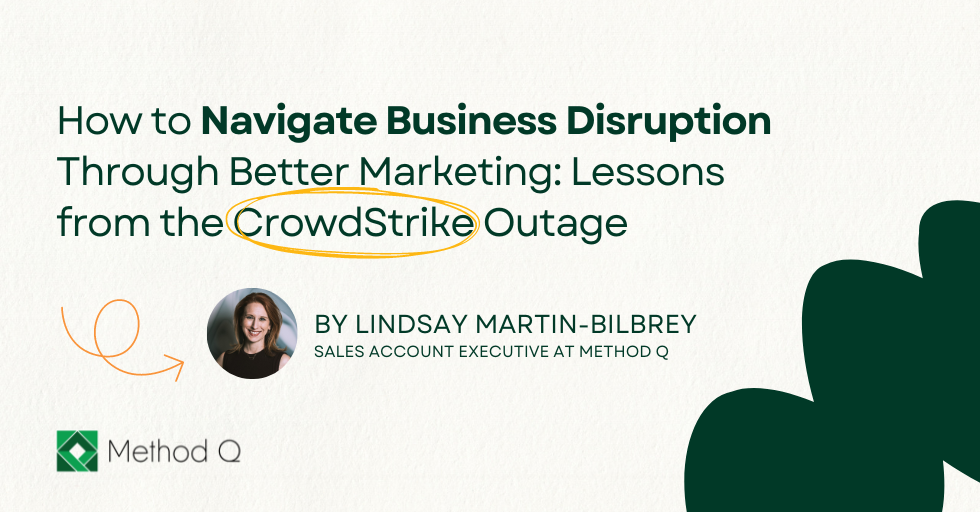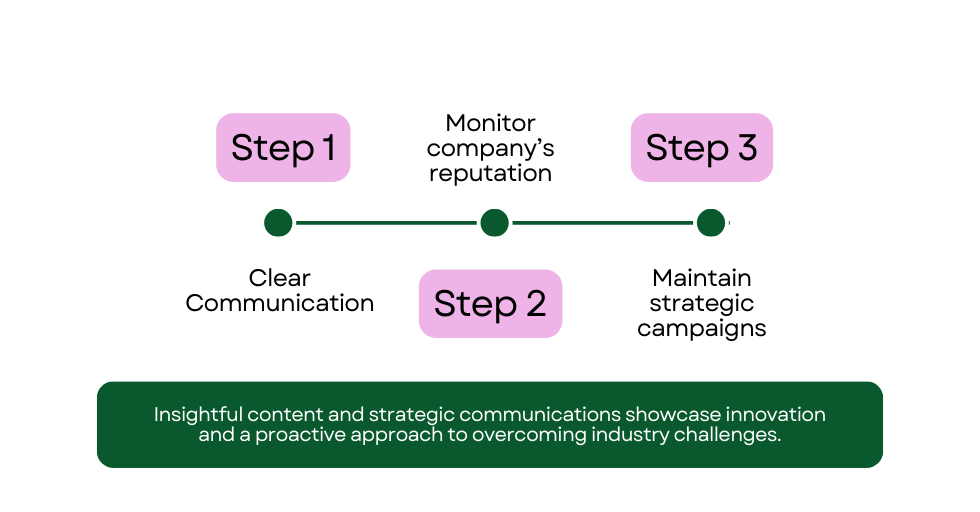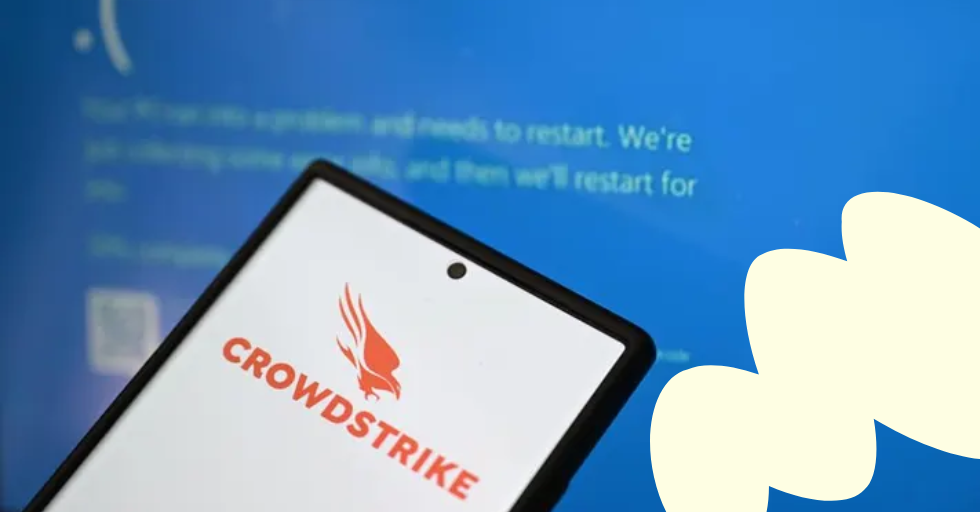
How did a single software update cause a global internet outage, throwing businesses worldwide into chaos on July 19?
In the aftermath of disruptions like the Crowdstrike incident, marketing emerges as a pivotal guide through turbulent waters. The incident vividly illustrates our vulnerability to technological hiccups and emphasizes the critical importance of our response to such events. Effective marketing in these situations revolves around three key pillars: communication strategy, reputation management, and maintaining customer trust.
This blog shares three marketing strategies and the keys to helping execute them so your business is in a better position to face a future business disruption.
- What was the Crowdstrike Outage & What’s That Got to Do with Marketing
- Why Marketing & Communication Strategies Matter During Business Disruptions
- What does effective marketing and communications look like during a business disruption?
- Three proactive marketing tactics businesses can adopt to stay ahead of potential crises and challenges
- Should My Business Use Our In House Marketing or Work With A Marketing Agency Before, During, or After a Business Disruption?
- How Method Q Can Help Your Business With Marketing and Strategy
What Was the CrowdStrike Outage & What’s That Got to Do with Marketing?
CrowdStrike, a top provider of cloud-delivered endpoint protection, faced a major outage that disrupted operations for many relying on their services. This incident highlighted vulnerabilities in digital infrastructure and emphasized the need for quick contingency plans and clear customer communication during such events.
During the outage, CrowdStrike’s endpoint protection services were down for nearly a full day, affecting organizations across various sectors. Industries like IT and finance, which heavily rely on continuous data protection and compliance, faced heightened risks.
Retail businesses, especially those using point-of-sale systems, encountered significant risks to customer data security. The disruption halted online and in-person transactions, raising concerns about potential breaches and regulatory compliance issues. This jeopardized customer trust and posed risks of financial penalties and reputational harm.
In the hospitality and travel industries, disruptions impacted crucial systems for managing customer experiences. Flight schedules, hotel bookings, and inventory management were affected, causing inconvenience for customers and operational challenges for businesses. These sectors, dependent on robust cybersecurity measures, were reminded of the importance of proactive planning and transparent communication to ensure operational continuity during tech disruptions.
Overall, businesses affected by the CrowdStrike outage faced major operational and communication hurdles, including immediate security risks and disruptions to daily functions. The visible impact on services led to immediate operational challenges, while longer-term effects included diminished customer trust and credibility. Effective crisis management, including prompt communication and proactive security measures, is essential for businesses to maintain resilience and uphold their reputation for reliability and security in challenging situations.
Why Marketing & Communication Strategies Matter During Business Disruptions
If your business faces a disruption, what strategies can you employ and when should you act?
We advocate for proactive strategies over reactive ones. The following three strategies can be developed well in advance of a crisis:
First, clear communication is essential. Marketing professionals should craft messages that keep stakeholders—whether customers, employees, or investors—informed about the impact of the disruption and the steps being taken to resolve it. This proactive approach enhances transparency, reduces confusion, and builds trust by demonstrating effective management of the situation.
Second, disruptions can significantly impact a company’s reputation, particularly in sectors requiring high levels of trust, such as cybersecurity and finance. Marketing teams monitor social media closely, swiftly addressing inquiries to mitigate any negative perceptions. Consistent messaging reinforces confidence in the company’s ability to address challenges promptly and maintain customer satisfaction.
Third, maintaining existing customer relationships and attracting new ones becomes critical during disruptions. Marketing efforts focus on providing timely updates and, where appropriate, offering incentives to maintain goodwill. Simultaneously, strategic campaigns highlight the company’s resilience and commitment to customer satisfaction, attracting potential clients.
Beyond immediate responses, marketing positions the company as an industry leader. Insightful content and strategic communications showcase innovation and a proactive approach to overcoming industry challenges. This thought leadership enhances the company’s reputation and instills confidence among stakeholders, demonstrating readiness to handle future disruptions effectively.
What does effective marketing and communications look like during a business disruption?
Consider Crowdstrike’s CEO, who swiftly addressed a recent disruption with a statement released within hours.
In his statement, Kurtz directly apologized: “I want to sincerely apologize to all of you for the outage. All of CrowdStrike understands the gravity and impact of the situation. We quickly identified the issue and deployed a fix, prioritizing the restoration of customer systems. The outage stemmed from a defect in a Falcon content update for Windows hosts; Mac and Linux hosts were unaffected. This was not a cyberattack. We are closely collaborating with affected customers and partners to ensure full system restoration for seamless service delivery.”
This proactive response addressed critical questions, concerns, and frustrations:
- He began with an apology.
- He assured stakeholders of the company’s understanding of the issue and their active efforts to resolve it.
- He clarified that the incident was not due to a cyberattack.
- He reassured customers that operations would resume promptly.
While this response did not prevent drops in Microsoft and Crowdstrike stock prices, it helped mitigate the impact. It did not resolve disruptions at airports or in brick-and-mortar point-of-sale systems, but it provided clarity and a way forward.
As we’ve emphasized: proactive marketing is key. Crowdstrike’s swift response was part of their plan.
Adopting this approach allows your business to anticipate and prepare for challenges, integrating crisis management tactics into a flexible plan that adapts as needed. This proactive stance enables your marketing efforts to address immediate issues, anticipate future needs, and navigate uncertainties with agility.
Three proactive marketing tactics businesses can adopt to stay ahead of potential crises and challenges
By implementing these proactive marketing tactics, businesses can enhance their resilience, maintain positive customer relationships, and navigate challenges effectively before they escalate into crises.

1. Continuous Audience Engagement and Relationship Building:
- Maintain regular communication with your audience through channels like email newsletters, social media, webinars, and blogs.
- Share valuable content, industry insights, and updates about your products or services to engage and inform your audience.
- Actively listen to feedback, address concerns promptly, and personalize experiences to strengthen relationships.
2. Thought Leadership and Content Strategy:
- Establish your brand as an industry authority by creating and sharing insightful content addressing industry trends, challenges, and innovations.
- Develop a robust content strategy including blog posts, white papers, case studies, and videos that showcase your expertise and thought leadership.
- Participate proactively in industry events, webinars, and speaking engagements to demonstrate knowledge and credibility among peers and customers.
3. Crisis Preparedness and Reputation Management:
- Develop a crisis communication plan outlining roles, responsibilities, and communication protocols in crisis situations.
- Monitor online conversations and social media channels to identify potential issues or negative sentiments early on.
- Manage your brand’s reputation proactively by responding swiftly and transparently to issues or crises, demonstrating accountability and a commitment to resolving concerns.
Should My Business Use Our In House Marketing or Work With A Marketing Agency?
In times of crisis, whether it’s a cybersecurity outage like CrowdStrike experienced or another unexpected disruption, effective marketing and communication are essential for safeguarding brand reputation and maintaining customer trust. The decision between using an in-house marketing team or partnering with a marketing agency hinges on several critical factors.
An in-house marketing team offers distinct advantages, primarily centered around their deep understanding of the company’s brand, culture, and operations. This familiarity allows for faster decision-making and alignment with organizational values during a crisis. Moreover, internal teams are readily available, ensuring swift responses and seamless integration with other departments to address emerging issues effectively.
On the other hand, marketing agencies bring external expertise and a fresh perspective gained from working across various industries. They offer specialized skills in crisis communication, digital marketing, and public relations, which can be invaluable during complex or high-stakes situations. Agencies also provide scalability, often equipped with resources for 24/7 support and comprehensive crisis management strategies.
The choice between in-house teams and agencies often depends on the nature and scale of the crisis. For crises requiring immediate and intimate knowledge of internal operations, an in-house team’s proximity and understanding can be advantageous. Conversely, situations demanding specialized skills, unbiased assessments, or additional resources may benefit from the external perspective and comprehensive services that agencies provide.
The most effective crisis management strategy often involves a collaborative approach. By leveraging the strengths of both in-house teams and external agencies, organizations can navigate crises with agility, maintain proactive communication, and safeguard their reputation. Whether choosing internal expertise or external support, prioritizing swift, transparent communication and strategic decision-making remains paramount for successfully weathering any storm in today’s fast-paced business environment.
How Method Q Can Help Your Business With Marketing and Strategy
In times of business disruption, partnering with a strategic marketing agency like The Method Q can play a crucial role in mitigating risks and ensuring operational continuity. Here’s how The Method Q and its services can help companies navigate and succeed despite challenges:
1. Specialized Expertise:
The Method Q agency has a team focused in cybersecurity technology marketing services, helping businesses develop strategies and communications tailored to their cybersecurity needs.
2. Strategic Leadership and Planning:
Our team at The Method Q can assist your business in strategy development, marketing capacity building, and goal achievement. We manage CRMs, Martech, and ABM software, providing comprehensive support from strategy sessions to execution and advanced reporting. This proactive approach helps businesses scale their marketing efforts and prepare for future disruptions.
3. Effective Communication:
Clear and timely communication is critical during crises like the CrowdStrike outage. The Method Q excels in crafting communications that reassure stakeholders, customers, and employees. By maintaining transparent communication channels, we help mitigate confusion and demonstrate proactive crisis management.
4. Reputation Management:
Safeguarding brand perception is paramount during cybersecurity incidents. The Method Q implements proactive reputation management strategies through targeted messaging and strategic PR efforts, ensuring companies uphold their reputation amidst challenges.
5. Digital Marketing Continuity:
Maintaining a digital presence is essential even during operational disruptions. The Method Q ensures continuity in digital marketing and demand generation efforts, leveraging alternative strategies and platforms to engage target audiences effectively.
In times of crisis, marketing proves invaluable in reassuring stakeholders and guiding businesses through challenges. Beyond promotional activities, marketing encompasses strategic communication, reputation management, customer relationship management, and thought leadership. These pillars are essential for preserving trust, ensuring business continuity, and positioning the company for long-term success in a dynamic business environment. By leveraging these strategies effectively, businesses can navigate disruptions like the CrowdStrike outage with resilience and emerge stronger.
Learn more about working with Method Q or sign up with a complimentary audit of your marketing today.




